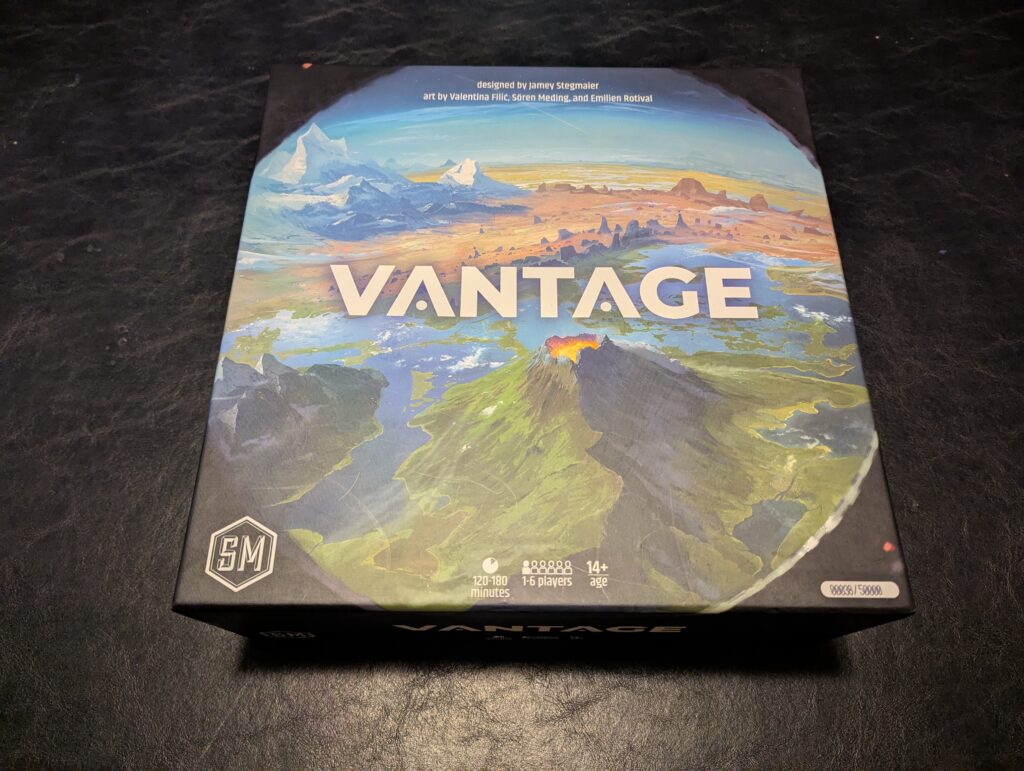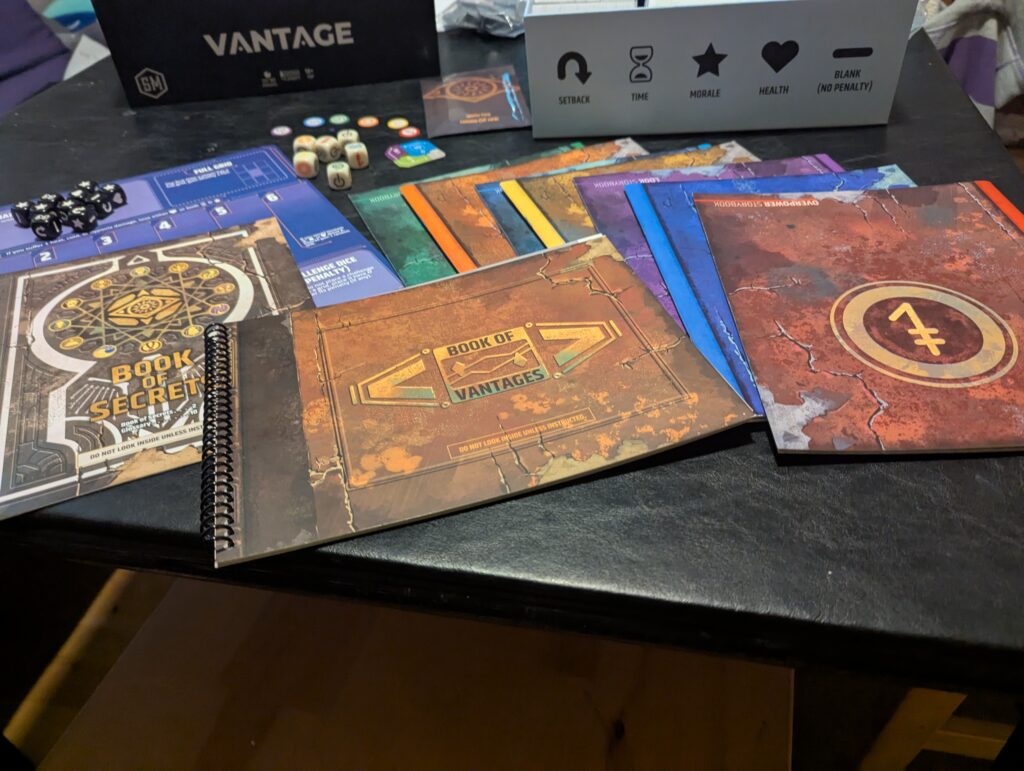
A bad thing happened to me and my family finances this month. I purchased a game largely on a whim and it’s become not only my favorite new game of 2025 but possibly…. ever. This is the equivalent of playing in traffic and finding a bag of candy; my lizard brain reward system is learning all the wrong lessons and this will come back to haunt me. That, however, is a future Leeman problem. Today’s Leeman gets to bask in the wonder that is Vantage.
To give you a better sense of my newfound obsession, this game was released two weeks ago and I was apparently the 38th person to click “add to cart” on the Stonemaier website despite knowing precious little about it except that it sort of looked like a scifi version of Tales of the Arabian Nights. Now Stonemaier has a proven track record of quality with Scythe, Tokaido, and Wingspan although funnily enough, while I can recognize that they are all good games, I have never quite fallen in love with them. There’s also the fact that this wasn’t a kickstarter but just a standalone release with little fanfare or to-do, just a confident “here’s our game, hope you enjoy.” Since it arrived, I have lugged all 10.5 pounds of it around and made no fewer than 8 of my most tolerant friends play it as well as poking its solo mode in what has to be over a dozen games so far.
The premise of the game is that players are explorers crash landing on different parts of an alien planet. Over the course of the game, players will explore biomes, engage with alien denizens, collect strange artifacts, avoid various hazards, and help each other achieve their original mission goal, their newfound destinies, or random side-quests. Imagine a less bleak version of Scavengers Reign. The art alternates between straightforward and dreamlike and the themes are abstract enough for your imagination to fill in the gaps.
Play is organized between the Location Cards which show where each player currently is and gives them options for how they want to engage with the world around them and tableau cards which represent their character, gear, sidekicks, pets, etc. On all the various cards are actions that players can choose based on six skills – Moving, Observing, Engaging, Aiding/Crafting, Taking, and Overpowering. Each of these skills corresponds to the different character roles players choose and they have their own book of results. On a typical turn, a player will pick a card and an action and then refer to the matching book and entry to see what happens as a result. Usually they’ll have to roll a certain number of Challenge Dice which has the potential to damage them. There’s a tracker for the three “hit points” – Health, Morale, and Time. If any of the trackers for any of the players hits Zero then the game (potentially) is over. To avoid taking damage, cards in a player’s tableau have open slots that can absorb these dice. Some of these slots are limited to certain skills or damage but some can even be used to help other players. Much of the cooperation of this game involves stepping in to help a teammate avoid getting hurt. Risk can also be mitigated by spending skill tokens which are accumulated throughout the game and then spent to roll fewer dice with any player being able to spend on behalf of their teammates. In addition, tableau cards also frequently take small cubes called Boosts which are used as power ups and can be spent to get bonuses and power abilities.

My original assessment of this game remains accurate although incomplete. Much like Tales of the Arabian Nights, Vantage is a game of exploring, drawing cards, making choices, and having a friend flip through books of story results based on those choices. The game then rockets off from this comparison in a couple of ways. First and most noticeably, its cooperative nature makes it feel much cozier and less capricious while avoiding the pitfalls of quarterbacking. There’s a seemingly arbitrary rule that states that players cannot show each other their Location card. Now this can partially be seen as a way to help avoid spoilers and make the game more replayable but the more immediate impact is that it gives the players ownership of their particular situation so one player can’t easily direct the others in what to do.
Secondly, while the choices and skills in Tales can feel at times somewhat disconnected with what happens in any given game, Vantage makes the results and consequences of choices matter and feedback loops start to develop as you play. If you keep choosing violence, then the violent options become more attractive over time. Same if you focus on diplomacy or sneaking or helping others. This isn’t a roleplaying game but story and a sense of play emerges and players can be rewarded for choosing the more narrative decision rather than the one that might be more mechanically efficient.
Finally, this game is a Mary Poppins bag of mechanics, concepts, and play. In the dozen or so playthroughs I’ve had over the last fortnight, I keep discovering new parts of this game. It isn’t a legacy game but it feels like it has taken some of the joy of discovery found in legacy games and imbued it in its panoply of cards and books. There is a Book of Secrets and a Book of Vantages both of which you might use once or twice in a game to get just a glimpse of what all the game has to offer. Minigames will pop up at random and suddenly you’ll find yourself doing a tricky logic puzzle or even a manual dexterity exercise. More than anything, Vantage feels like the old point and click adventure games of the 90s, complete with choosing whether to Look At, Go North, Pick Up, Push/Pull, etc. It’s like all the best parts of Monkey Island, The Dig, Fate of Atlantis, or Myst but with your friends all seated together taking turns and offering suggestions of what to do and where to go next.
I have no doubt that over time the novelty will wear off but so far I’ve discovered an almost bottomless well of delight putting this game in front of friends and seeing their faces light up when they uncover some whimsical bit of art or a new mechanic that emerges from their choices. I think it’s telling that while I could play this game by myself with little mechanical difference from playing it with friends, the joy of communal discovery and revelation is where this game shines again and again. I’m looking forward to seeing just how much joy I can squeeze out of it.

Whimsical–that’s what this game is! I’ve played 10 times and discovered some whole new mechanic every time. It’s fun alone and with friends. I enjoyed reading your review of it and I’m intrigued by the dexterity comment. Seems like there is yet more to discover 🙂 I’m on the hunt for backstories or more information about the characters. I have a feeling I know how to learn more about the characters, but haven’t achieved that in the game yet. I also gotta know what’s the deal with this enigmatic Traveler!
Also, love your blog title!
The characters are all left pretty vague. The missions are about as close as you get to some sort of history or motivations. Tons of fun seeing the different hijinx they can get into regardless.